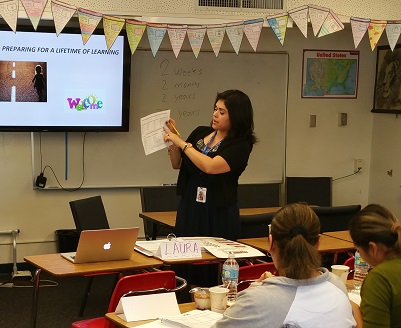
Facilitators play a significant role in the School Smarts Parent Engagement Program. They lead parents through the curriculum, facilitate meaningful discussions and encourage parents to develop connections with their child’s school. Facilitators are also members of their school site Planning Team.
School Smarts Model
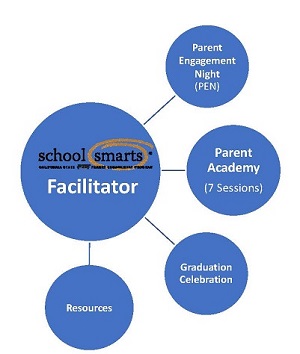
The School Smarts model provides you with information on how the program is divided into three key elements. See below for more information on how the role of facilitator works with in each element:
Parent Engagement Night (PEN): The PEN is a crucial part to marketing and outreach of the School Smarts Parent Engagement Program. The Facilitator coordinates with the school site Planning Team to invite parents to attend the PEN event. Facilitators also present at the PEN to talk about the School Smarts Parent Engagement Program.
Parent Academy: The Facilitator leads the parents through the seven-session Parent Academy. The Facilitator is the primary liaison between the California State PTA and the school site related to program materials and program requirements.
Graduation Celebration: The Facilitator joins parents in celebrating their commitment and achievement. They lead the graduation celebration as well as coordinate special guests and parent testimonials.
Building relationships
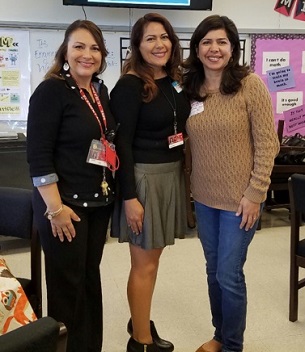
Building relationships and trust with your parents is very important. Get to know them and celebrate their successes. To make the experience as meaningful as possible for them, here are a few suggestions:
- As participants arrive, greet them and make sure they sign in and collect the session’s information and handouts
- Make sure everyone has a name tag
- Emphasize the need for everyone’s participation and input during the session
- Set the tone for collaboration
- Introduce each session by listing the key points to be covered and objectives.
Lesson Plans and Session Planning
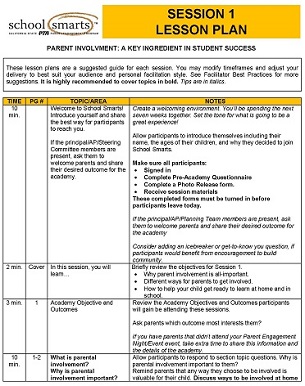
Lesson plans are found in your Facilitator packet and provide you with a guideline on how to facilitate each session. We recommend that you review your lesson plans in advance of each session and make sure you have all materials and items prepped. Here are some additional things you can do to ensure that your families feel welcomed and ready to be engaged:
- Organize your room and set up art activities before parents arrive
- Stay on task
- Encourage creative thinking
- Establish action items
- Follow up with parents as needed especially if they have missed a session
- Remind parents of the value of arts in education
Time Management

Plan ahead and manage your time. There is a lot of information to cover during each Parent Academy session. Planning ahead helps you provide a productive learning environment for parents. Here are some things that you can do in advance to make sure you’re prepared to stay on track.
- Set up sign-in table
- Set up art materials in the classroom in advance
- Have any media prepared
- Keep special guests and presenters on time
Parent volunteers are helpful and can assist with session logistics in the following areas:
- Support parents with art projects
- Clean up after class
- Volunteer for childcare
- Set up and clean up dinner
Guests Speakers/Presenters
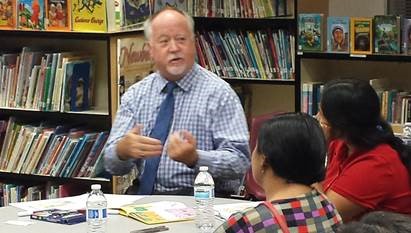
There are several opportunities throughout the Parent Academy to have guest speakers. Session 4 offers an opportunity to invite the principal, a school board member, the superintendent, district staff or PTA leader to discuss their roles.
Here are a few tips to make the best use of your speakers’ time:
- Let presenters know how much time they have to speak
- Have them share a description of their role in education
- Inform parents how to reach them (if applicable)
- Allow time for questions and answers
NOTE: this is the time to get to know the presenter and their role, not to engage in debate on specific issues.
Working with a diverse group of Parents

The School Smarts Curriculum works for all levels of parent knowledge – it’s how you approach and apply it that makes the difference! Remember that you are a facilitator – you facilitate dialogue and knowledge from the participants in your Parent Academy. Make sure to give opportunities for all parents to share. Everyone has a valid point and deserves to be heard.
Modifying the Curriculum:
There may be times where you need to modify the curriculum content, as you may have parents with different reading skill levels or language barriers. Feel free to adjust the way you deliver the material so it takes into consideration where each parent is in their learning level.
How do you assess your class level?
- On the first night it will be very apparent how comfortable and familiar your parents are in the school setting, and their personal level of education. Also reviewing the Pre-Academy Questionnaire data will provide you with information about the parents in your class.
- Asking the group questions like “how many of you went through the educational system in California Schools?” “How many in another country – which one?” will introduce them to each other and indicate their level of familiarity with the system.
- Utilizing Pre-Academy questionnaires data and your personal assessment of the parents, make sure to adjust your facilitation strategies to best support your parents.
Working with parents who have pervious experience with the education system:
The education system is always evolving and changing. For parents who have previous experience with the education system, here are some things to keep in mind when facilitating your Parent Academy:
- You are a coach rather than a teacher.
- It’s a conversation vs. an instruction.
- You are “meeting them where they are” and building on knowledge they already have. Your job is to help them understand what it means for them, how the concepts are relevant to their lives. Through discussion, they will get ideas on how they can be more effective in employing the information, help each other with best practices and begin to think in deeper ways about the topic.
- Your goal is to encourage them to become advocates and leaders for their child and school community.
Using Interpreters and headsets:
Sometimes interpretation is necessary when working with a diverse group of parents. Keep in mind that some parents did not attend school in the United States or whose primary language at home is not English. Keep the following in mind when providing your Parent Academy with interpretation assistance:
- The use of an interpreter and headset provides for better and more class participation from non-English speaking parents.
- Make sure the interpreter knows its okay to interrupt you with questions the parents may have.
- Find out who is responsible for the headsets, before and after class and follow the school’s instructions for using them.
- Remind parents to turn headsets by end of the session.
Ordering Program Materials
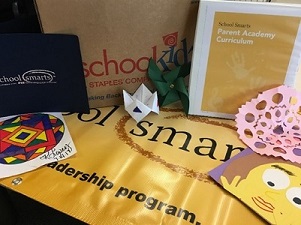
Curriculum Order: Each School Smarts Parent Engagement Program will receive curriculum binders for each parent and an art supply kit for up to 30 participants. The facilitator should ensure that all materials are properly distributed at Session 1.
The curriculum order includes:
- Curriculum
- Binders
- Art kit
- Pre/Post Questionnaires
- Photo-release forms
- Postage packet for program requirements.
To ensure there are enough curriculum materials for your Parent Academy, you must submit a curriculum order to the School Smarts staff at programsupport@capta.org at least two weeks prior to your Session 1.
Program requirements
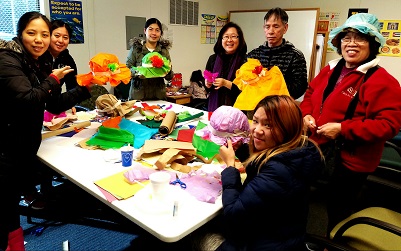
As part of School Smarts Parent Engagement Program, the Facilitator is responsible for completing and turning in the following program requirements. We use this information to provide reports to your school district and make program refinements. Please be sure to complete and turn in these items below:
- PEN Report Form: Complete after the Parent Engagement Night. This information is used to create best practices and to share out your event and art activities with the School Smarts community.
- Weekly online facilitator survey: This survey is due after your first session and every session thereafter. We use this information to keep track of attendance as well as check feedback to provide facilitators with more resources.
- Parent Academy Attendance Record: Take attendance at each session and at the end of session 7, turn in attendance record. We use this information to share parent participation with your district in the Program Summary Report.
- Pre- and Post-Academy Questionnaires: These are questionnaires each participant completes. Pre-Academy Questionnaires will be completed at Session 1 and Post-Academy Questionnaires at Session 7. These forms are needed for all participants.
- Photo Release Forms: Please have all parents complete a photo release form at the Session 1. Photos are a great way to document program progress and highlight parent participation throughout the Parent Academy.
- Graduation Roster: Three weeks prior to your last session, please complete a graduation roster to receive personalized graduation certificates and holders for your parent participants.
- Action Plan: Please submit a copy of the Action Plan. As parents go through the Parent Academy they will learn and build from their knowledge and create an Action Plan as a group.
Facilitator role At-a-glance
Below you will find a flow chart to help you as you take on the role of Facilitator.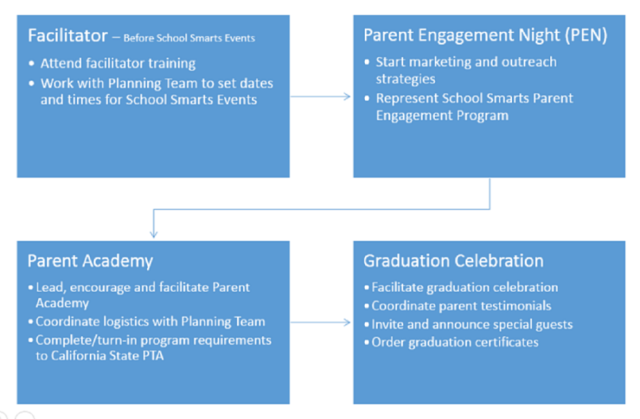
Take a look at the facilitator refresher video for additional tips, reminders and support.
Resources
Click below to download Session PowerPoints and Lesson Plans for each session.
Session PowerPoints:
- Session 1: English Spanish
- Session 2: English Spanish
- Session 3: English Spanish
- Session 4: English Spanish
- Session 5: English Spanish
- Session 6: English Spanish
- Session 7: English Spanish
Session Lesson Plans:
- Session 1: English Spanish
- Session 2: English Spanish
- Session 3: English Spanish
- Session 4: English Spanish
- Session 5: English Spanish
- Session 6: English Spanish
- Session 7: English Spanish
Be sure to check out the School Smarts art instructional videos in Resources and Best Practices.
For questions or more information please contact us at programsupport@capta.org.